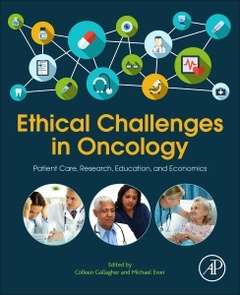Ethical Challenges in Oncology Patient Care, Research, Education, and Economics
Coordonnateurs : Gallagher Colleen, Ewer Michael

Ethical Challenges in Oncology: Patient Care, Research, Education, and Economics covers a wide variety of topics and viewpoints about ethical issues that arise in oncology throughout the full cancer care continuum. This book provides a holistic view on oncology ethics, incorporating the knowledge and expertise of authors from various departments and oncology specialties within the University of Texas MD Anderson Cancer Center.
The first section focuses on the ethical issues associated with treating cancer patients. Next, the ethical challenges associated with oncology research, including funding, regulation, subject selection and the big picture are explored. The third section covers ethical issues associated with education in oncology as it reflects both past and future trends in developing proficient health care providers, patients and even executives. Final sections concentrate on the ethical dilemmas associated with the economic repercussions of oncology, offering thoughts on how to alleviate the ethical consequences that can arise from the global effects of cancer and cancer treatment.
Each chapter includes discussion topics, answers pertinent questions and provides an ethical framework for problem- solving in each scenario. The topics uncover the ethical apprehensions and problems associated with oncology research and practice in order to determine best practices as well as provide guidance for all parties involved.
Section 1: Patient CareOverview1. Patient Experience2. Clinician Experience3. Continuous Quality Improvement
Section 2: ResearchOverview4. Sponsor/Regulatory5. Future Of Research6. Treatment Through Research Or Standard Of Care
Section 3: Educational EnvironmentOverview7. Training Future Leaders8. Patient Education
Section 4: Economics Of CancerOverview9. Commercialization10. Treatment Cost Disparity and Equitable Cost Containment11. Employer Provided Health Insurance12. Legal Barriers and Lack of Transparency
Section 5: Future DirectionsOverview13. Community Engagement14. Diversity15. Emerging Science Trends
Dr. Gallagher holds appointments on various national and international committees. She has served also as Co-Chair of Clinical Ethics Consultation Affairs Committee for American Society of Bioethics and Humanities (ASBH) and as Ethicist for the Healthcare Quality Professional Task Team of the National Association for Healthcare Quality (NAHQ).
Michael Ewer is a Professor of Medicine and an administrator at M. D. Anderson Cancer Center where he has served for the last 35 years. He is a faculty member of the University of Houston Health Law and Policy Institute where he teaches Health Law, and Hospital Law and Ethics. Additionally, Dr. Ewer holds a Master of Public Health and a Master of Business Administration degree. He received his JD and LLM degrees from the University of Houston Law Center. Dr. Ewer has broad experience in medical ethics, conflicts of interest, medical communication, patient relations, and uncompensated (charity) medical care. Dr. Ewer has published extensively in the fields of oncology, medical ethics and philos
- Offers a diverse range of topics and viewpoints about ethical issues that arise in oncology
- Provides direction by bringing real issues to the forefront
- Contains a truly ethical approach on problems as broad as research, finance, appropriateness of care, and professional education
Date de parution : 06-2017
Ouvrage de 348 p.
19x23.3 cm
Thèmes d’Ethical Challenges in Oncology :
Mots-clés :
Access to capital; Acquisition; Advance care planning; Advance directive; Advocacy; Alternative medicine; Autonomy; Beneficence; Big data; Biobank; Bioethical principles; Bioethics; Biomedical research; CAIM therapies; Cancer and ethics; Cancer survivorship; Cancer survivorship ethics; Clinical; Clinical care; Clinical decision support; Clinical ethics; Clinical trials; Clinical uncertainty; Commercialization; Common rule; Communication; Communication strategies; Communications; Complementary medicine; Compliance; Conflict resolution; Conventional medicine; Cost; Cultural awareness; Cultural sensitivity; Culture; Data breach; Diversification; Diversity; Doctor; Economy of scale; Effective leadership; Electronic medical record (EMR); Electronic order entry; End of life; End-of-life care; Ethical challenges; Ethical code; Ethical imperative; Ethical leadership; Ethics; Family-oriented care; Finance; GINA; Genetic counseling; Genetics; Genome; HIPAA; Health educator; Health literacy; Health-care costs; Health-care-industry; Healthcare data; Healthcare finance; Human subject; Incidental findings; Information technology; Informed consent; Informed consent by minors; Informed decision making; Institutional ethics; Insurance; Integrative medicine; Leadership development programs; Leadership in healthcare; Leadership styles; Learning health system (LHS); Legal; Legislation; Market share; Medicaid; Medical; Medical futility; Medical practice; Medically appropriate options; Medically nonbeneficial; Medicare; Medicine; Merger; Moonshot; Nonmaleficence; Nurse; Nursing; Oncology; Organizational ethics; Organizational identity; Partnership; Patient education; Patient engagement; Patient expectations



